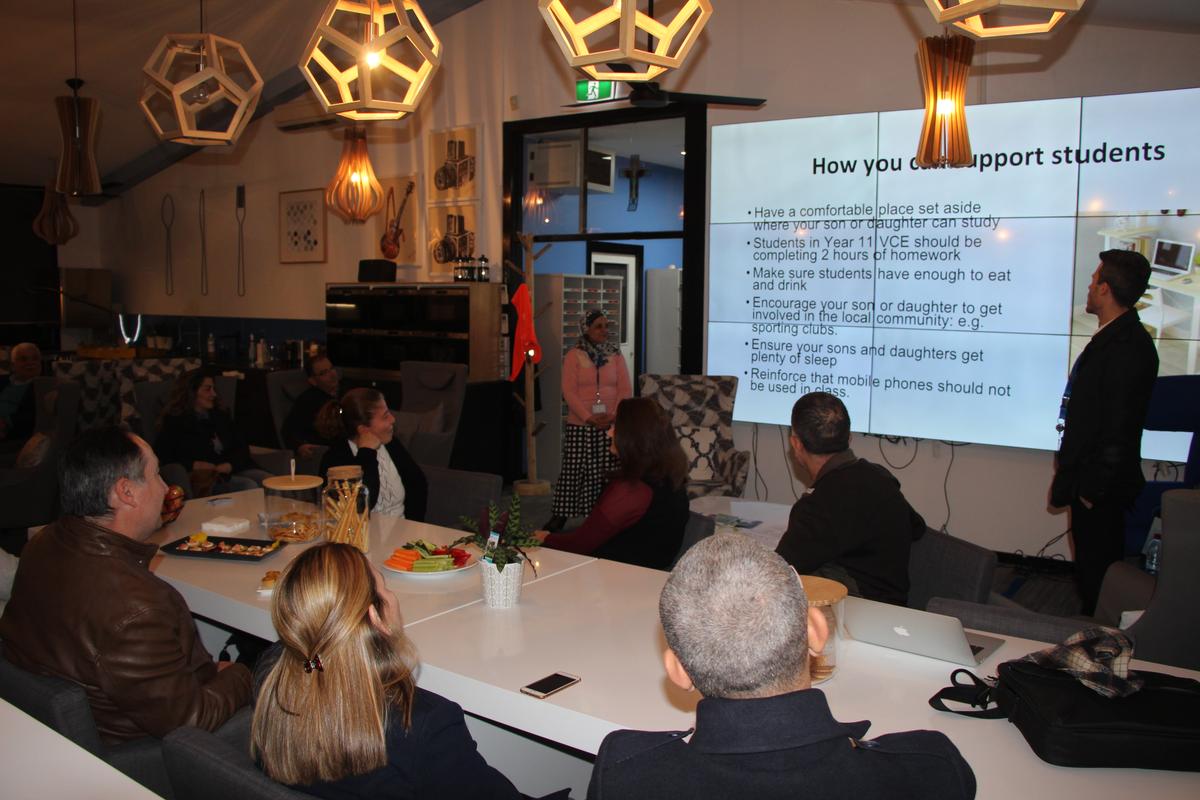Deputy Principal's Report

Collaborating with our Community
The College held the second round of information evenings for families in our community from Culturally and Linguistically Diverse Backgrounds. The focus of the evenings was to provide information pertaining to pathways beyond the senior years and programs developed to enhance student engagement with the learning programs. As groups including staff, students and parents, we were able to consult further about how partnerships may enhance outcomes and a sense of belonging for these students. We look forward to working further with these families in term three.
Anaphylaxis Management
Catholic Regional College Sydenham is committed to providing a safe learning environment for all our students and complying with the current Ministerial Order No.706 and the Department of Education and Training's Anaphylaxis Guidelines as amended by the Department from time to time (Guidelines).
The College recognises that it cannot achieve a completely allergen free environment. It is our policy:
- To provide, as far as practicable, a safe and supportive environment in which students at risk of anaphylaxis can participate equally in all aspects of the student’s schooling;
- To adopt the recommendations of the Guidelines where relevant to the College;
- To raise awareness about anaphylaxis and the College’s anaphylaxis management policy in the college community;
- To engage with parents/carers of each student at risk of anaphylaxis when assessing risks and developing risk minimisation strategies for the student; and
- To ensure that staff have knowledge about allergies, anaphylaxis and the College’s policies and procedures in responding to an anaphylactic reaction.
It is the responsibility of parents and carers to:
- Provide the School with an emergency procedures plan (ASCIA Action Plan), which includes a current colour photo of their child. This will be scanned in original condition into the Student Information System (SIS).
- Supply the School with their child’s adrenaline auto injector and ensure it has not expired, which is stored at the front office.
- Work with the School to develop an individual management plan and review it annually.
- Give permission for their child’s photo to be displayed in areas around the School.
The College has devised processes to respond to anaphylactic incidents, with staff undertraining training every two years, with briefings every 6 months. These include:
In the classroom
- Identify the student (Photographs located in Year Cluster Office).
- Lay student flat/Sit the student up (depending on response from student). Do not allow them to stand or walk. Do not leave the student.
- For an insect allergy, flick the sting out if it is visible.
- Contact the front office by email / phone, or send a student to Reception for the First Aid Officer to provide an immediate response with the EpiPen and Management Plan including the ASCIA Plan. This includes the delivery of the auto injector device.
- Teacher/First Aider (if trained in administering an EpiPen) to administer the EpiPen.
- Teacher/First Aid Officer to notify 000.
- Teacher/First Aid Officer to notify Parents/Carer.
At recess / lunchtime
- Identify the student (Photographs attached to the yard duty boards.
- Lay student flat/Sit the student up (depending on response from student). Do not allow them to stand or walk. Do not leave the student.
- For an insect allergy, flick out the sting if it is visible.
- Contact reception immediately on the walkie-talkie for the first aider to provide an immediate response with the EpiPen and Management Plan including the ASCIA Plan. This includes the delivery of the auto injector device.
- Teacher/First Aider (if trained in administering an EpiPen) to administer the EpiPen.
- Teacher/First Aider to call emergency assistance on 000.
- The Teacher/First Aider to notify Parents/Carer.
School Excursions / Camps / Sporting Events
- Be aware of medical conditions of students in your care by checking SIMON Profiles.
- The activity organiser is responsible for ensuring that Students who are at risk of anaphylaxis have an auto injector, antihistamine and ASCIA Action Plan packed for the event.
- Communication devices e.g. mobile phones, satellite phones, should be packed to ensure the ability to communicate if so required.
- The teacher (if trained in administering an EpiPen) consults the Action Plan and follows the plan, administering the auto-injector promptly.
- Teacher/ Supervisor to call emergency assistance on 000.
- The Teacher/ Supervisor to notify Parents/Carer.
- The Teacher / Supervisor to notify School.
- Incident report to be completed upon return to the School.
Advice for this time of year
Given that there are 168 hours in the week, students should consider:
What is your total commitment of time for the following?
Your Time/Week: Recommendations:
School + Homework study = 40 hours minimum.
Leisure/ sport = minimum 12 hours.
Part-time work = maximum 9 hours.
Sleep = 8 – 9 hours/day.
Travel times = ?
Leisure/TV/Visiting/relaxation = ?
Other = ?
Reflect on this: Are there time wasters here? Are there opportunities to balance some of your activities? Can more time be found to allocate to your study commitments? Are there some areas that could have a negative impact on your education/ life balance?
Use the Study Techniques and Approaches section of the Student Diary to complete a revised weekly plan that creates life balance, to put you in control of your education at Catholic Regional College Sydenham.
Students have received a detailed timetable outlining events at the end of semester 1. We wish all of our students well, it is not a matter of luck but sound preparation that will generate results that reflect each student’s potential.
Tips for parents during exams (from online forum The Spark)
1. Don’t sweat the small stuff
Consider the build-up to and during exams as an amnesty on issues that would typically cause some friction. Bedrooms might be messier than usual. Chores might be forgotten. But all of that is ok.
It is easy for parents during exams to revert back to the normal habit of badgering their teenager in to action. By easing off on the usual household duties you will however be giving your child more time and space to focus on exam revision. Once exams are out of the way the temporary suspension can lift and son or daughter can do a bit of catching up. Maybe this is something you can negotiate?
2. Talk about exam nerves and realistic expectations
Though it might seem akin to poking a caged tiger, gently encourage your daughter or son to talk, when ready, about exam nerves. How are they feeling? What pressure are they putting on themselves to deliver certain results? Emphasise that such feelings are completely normal and to be expected. Remind them of their hard work to date to build confidence.
3. Help make time for exercise during exam preparation
Parents during exams want their kids to do as well as they can. By definition that entails a commitment to revision, past papers and the like. A regime of eat-sleep-study-repeat is, however, counter-productive.
Physical exercise releases endorphins – the body’s natural mood lifter. This helps to clear their mind and take them out of the exam pressure cooker. Parents can play a vital role in encouraging and making exercise possible. For example by offering to take them to and from a sports venue or paying for them to take a night off studying to hit the gym. Help them put together a study schedule that includes regular breaks for exercise and encourage them to maintain attendance at sporting clubs or groups.
4. You get out what you put in
Along with exercise to help keep your child out of an eat-sleep-study-repeat cycle, play your part in terms of maintaining a good diet and chill out time. Focused time revising for exams is important but a cycle of study with few breaks and surviving on a diet of ‘at the desk’ snack food and energy drinks will compromise their health and exam preparations.
5. What are you expecting from them during their exams?
Parents naturally want their children to do well in exams. That is completely natural. Most kids place enough pressure upon themselves during study and exam preparation to make that outcome a reality. Additional expectations, demands or pressure from mum and dad can end up being more damaging than useful.
The application of additional pressure by mum and dad may be explicit, like telling them you want them to achieve certain grades. Or it can be more implicit, like how you talk about your expectations for exam success in front of their friends/parents of their friends.
Reassure them of your love and support no matter what the outcome of exams and emphasise that this is not the be all and end all for them.
Many thanks to The Spark (https://www.thespark.org.uk/tips-for-parents-during-exams/)

